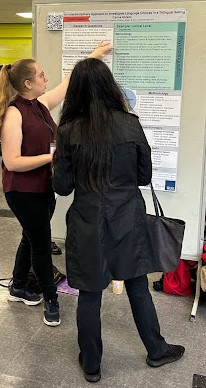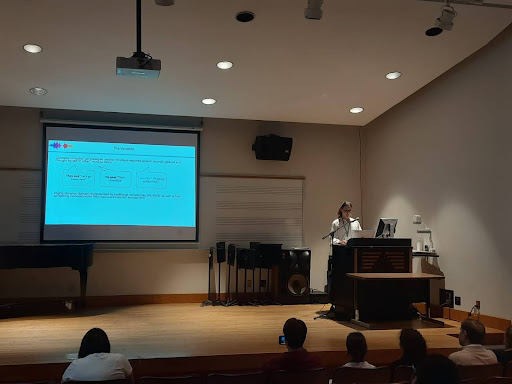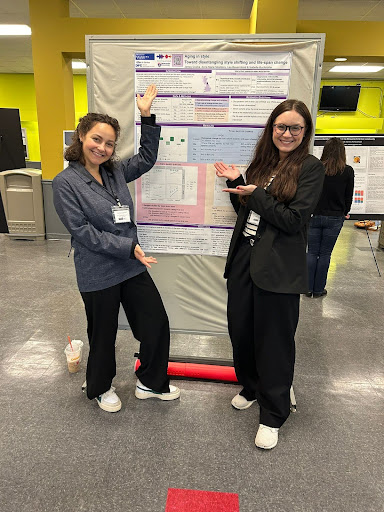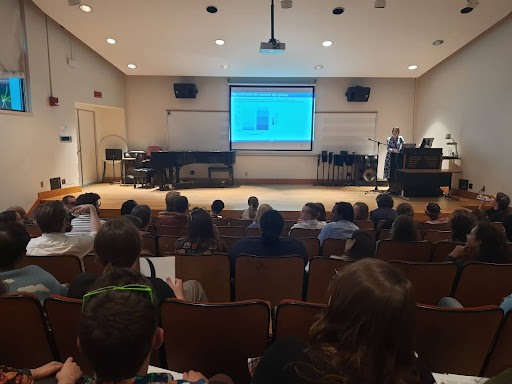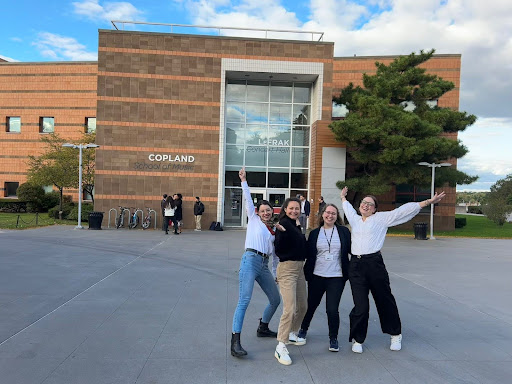Four LaVaLi representatives recently attended the 51st New Ways of Analyzing Variation conference in New York, organized by NY’s Queens College. The conference featured an array of insightful talks and posters and the team had a blast!
Carina Ahrens presented a project launch poster on her upcoming project, which is analysing language dominance in multilingual speakers’ brains. The project aims to combine perspectives from sociolinguistics and psycholinguistics to investigate different areas in the linguistic architecture and see whether speech in a laboratory and conversational speech behave in the same way. The goal is to reinterview and reconduct cognitive tests with the same individuals to see how a longer exposure to a dominant foreign language (by staging in a country where that language is spoken) influences another learned language.
Anne-Marie Moelders presented findings on her ongoing PhD research on the quotative system. She was supposed to be joined by Isa Buchstaller who sadly couldn’t attend as her ESTA was denied (that’s what you get for attending a colleague’s wedding in Iran). Quotatives are used to introduce speech or thoughts, such as “I said: I’m going home”. Their talk focused on the newcomer be like (e.g. I was like “this is great”). Their findings highlight that speakers over thirty avoid using be like, which is associated with young speakers and female speech. Meanwhile, a gendered effect was observed in younger age groups, with women increasing its use and men reducing it. Anne and Isawere the first to investigate be like in a panel sample (that is: the LaVaLi corpus!) that spans the whole adult lifespan!
Anne Moelders and Lea Bauernfeind furthermore presented on the different ways in which speakers realize variables that are currently undergoing change in the community such as the FACE vowel – in words like FACE, GATE, and BAY – and the first person possessive as in “it’s my house”. Together with James Grama and Isa Buchstaller they find that speakers do indeed produce different patterns for these variables depending on the situational context (formal interviews vs relaxed conversations with friends and family). The data suggest that speakers in their 30s realize really interesting linguistic patterns. We hypothesize that this is due to the professional pressures (we like to call them linguistic marketplace pressures) these individuals are subjected to in their everyday lives (at work and elsewhere).
Johanna Mechler presented findings of one of her ongoing PhD research projects, in which she compared US and UK listeners’ evaluative responses to Tyneside voices. In an online experiment, participants were asked to listen to and to rate voice samples by female and male speakers of the LaVaLi corpus who were in their 20s and 40s.
Surprisingly, the results revealed no significant difference between US and UK listeners. However, Johanna found strong age and gender effects in her data: Middle-aged male speakers are perceived as more intelligent and more professional, especially when we compare their results to female speakers in their 20s. On the other hand, younger female speakers are perceived as significantly more friendly and more trustworthy than younger male speakers. So, typical (socio-normative) age and gender stereotypes are also evident in speech perception.
Lea and Johanna also gave a talk on behalf of their co-authors James Grama and Isa Buchstaller, focusing on the realization of the linguistic variable (ing) in “running” vs “runnin’”. They find that most speakers from the North East of England, and especially the younger ones, realize the majority of their “running words” as “runnin’ words”, irrespective of whether they talk to a good friend or an unfamiliar interlocutor. This might come as a little surprise considering that other studies have found speakers to orient towards more polite speech, i.e. “running words”, when speaking to strangers but we think the lack of this phenomenon is due to the overwhelming presence of “runnin’ words” in the speech community. Nonetheless, we find that speakers do indeed produce more polite variants/“running words” when they’re reading compared to when they’re speaking. That’s so cool!
Thanks again to the organizers of this fantastic conference and to all the attendees who we got talking to! See you next year at NWAV52!

